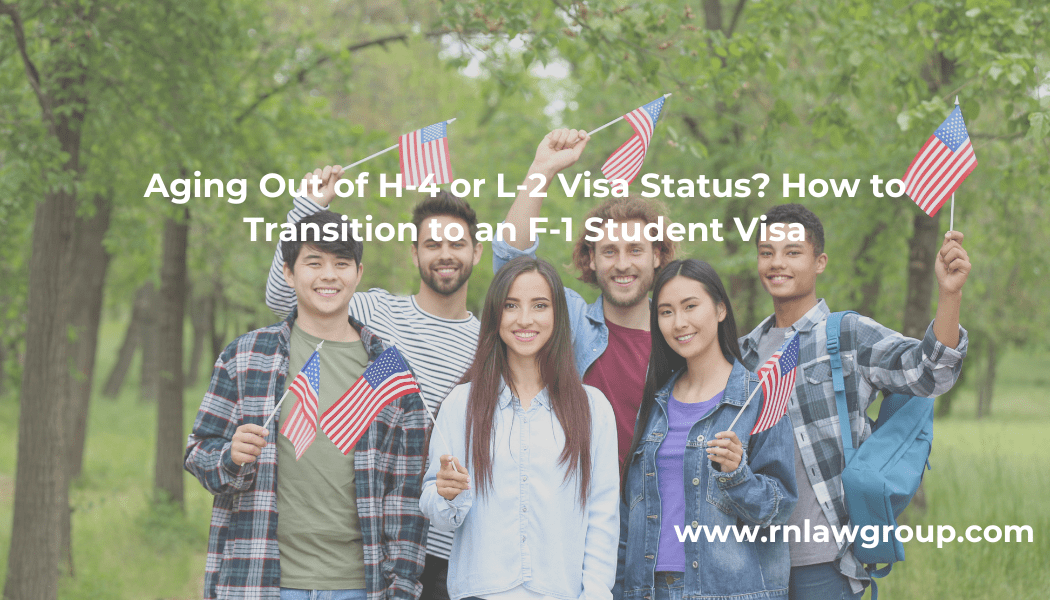
Aging Out of H-4 or L-2 Visa Status? How to Transition to an F-1 Student Visa
Planning for Aging Out of H-4, L-2, E-2, or O-3 Dependent Status
Children who hold dependent nonimmigrant statuses such as H-4, L-2, E-2, or O-3 are permitted to remain in the United States based on their relationship to a principal visa holder. However, these dependent benefits generally end when the child turns 21 years old, at which point they “age out” and can no longer maintain their dependent status. Families must plan ahead for this transition, as turning 21 may require the child to obtain a new immigration status to lawfully remain in the United States without interruption.
Transitioning to F-1 Student Visa Status Before Turning 21
One common option for dependent children who are nearing their 21st birthday is to transition to F-1 student status. The F-1 visa allows individuals to remain in the United States to pursue full-time academic studies at an accredited college, university, or other academic institution. To qualify, the student must first obtain admission to a qualifying school and receive a Form I-20, which is required to apply for a change of status or to seek an F-1 visa at a U.S. consulate abroad. Currently, U.S. Citizenship and Immigration Services (USCIS) offers premium processing for F-1 change of status applications, with an expedited processing timeline of 30 calendar days once all prerequisites are completed. Given the importance of maintaining uninterrupted lawful status, families should plan early to ensure the F-1 change of status is filed and approved before the child’s 21st birthday.
Key Documents for Filing Form I-539 to Change to F-1 Status
When filing Form I-539 to request a change to F-1 student status, it is important to include a complete set of supporting documents to avoid delays or denials. Key documents typically include:
(1) a copy of the applicant’s valid passport biographic page;
(2) a copy of the applicant’s current I-94 record;
(3) copies of the principal visa holder’s passport and current immigration documents, including recent pay statements;
(4) a Form I-20 issued by the school, properly signed by both the designated school official (DSO) and the applicant;
(5) proof of financial ability to cover tuition and living expenses without the need for unauthorized employment, such as bank statements, investment account statements, affidavits of support, or scholarship letters; and
(6) a written statement explaining the applicant’s intent to pursue a full course of study and depart the United States after completing studies, consistent with the requirements for F-1 status.
Additional documents, such as evidence of ties to the home country, may also be helpful depending on the circumstances.
Demonstrating Ties to the Home Country for F-1 Visa Approval
Although a 21-year-old who has grown up in the United States may have strong connections to the U.S., demonstrating ties to their home country is still essential to establish eligibility for F-1 student status. Evidence of ties can include maintaining a foreign permanent address (either personally or through parents), having close family members who reside abroad, retaining ownership of property or financial interests in the home country (including property owned by the student’s parents), or maintaining cultural, social, or professional affiliations there. The student’s personal statement outlining future career plans in their home country, describing how their U.S. education will be used to pursue specific job opportunities, professional goals, or obligations abroad can also be useful. Even if the connections are primarily familial or aspirational, it is important to frame them clearly to show that the student does not intend to remain permanently in the United States after completing their studies.
Approved I-140 Petitions and F-1 Student Visa Eligibility
Even if a parent has an approved I-140 immigrant petition, it is still possible for a child aging out of dependent status to be granted F-1 student status. While an approved I-140 reflects the parent’s intention to immigrate permanently to the United States, it does not automatically disqualify the child from obtaining F-1 status, which requires demonstrating nonimmigrant intent. USCIS recognizes that a child’s immigration plans may be independent from their parent’s plans. Therefore, if the child can show that their immediate intention is to pursue a full course of study in the United States and then depart upon completing their education, F-1 status may still be approved. Careful preparation of the personal statement and supporting documents is critical to affirm the child’s present nonimmigrant intent, even if longer-term immigration options may exist through the parent.
Conclusion: Early Planning Is Key for Aging-Out Dependent Children
Aging out of H-4, L-2, E-2, or O-3 dependent status can create significant challenges for families, but with early planning and careful preparation, eligible children can successfully transition to F-1 student status and continue their stay in the United States. Understanding the application process, gathering strong supporting documents, and demonstrating clear nonimmigrant intent are all essential steps. Families should start preparing well in advance of the child’s 21st birthday to avoid any gaps in lawful status and to ensure a smooth transition to independent student status.
By: Emily Neumann, Managing Partner, Reddy Neumann Brown PC
Emily Neumann is Managing Partner at Reddy Neumann Brown PC with 20 years of experience practicing US immigration law providing services to U.S. businesses and multinational corporations. Emily has helped transform the firm from a solo practice to Houston’s largest immigration law firm focused exclusively on U.S. employment-based immigration. She received her Bachelor’s degree in Biology from Central Michigan University and her Juris Doctorate degree from the University of Houston Law Center. Emily has been quoted in Bloomberg Law, U.S. News & World Report, Inside Higher Ed, and The Times of India on various hot topics in immigration. She is a member of the American Immigration Lawyers Association and Society for Human Resource Management.

